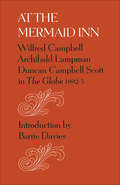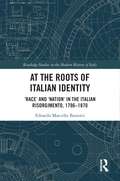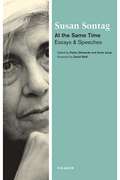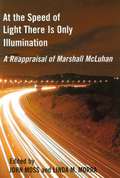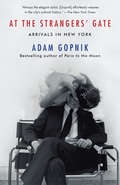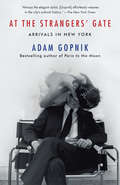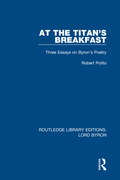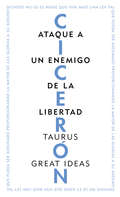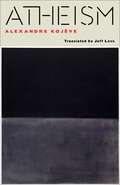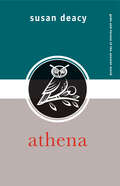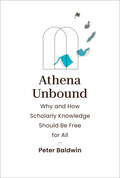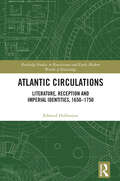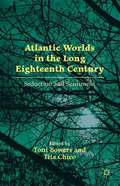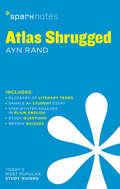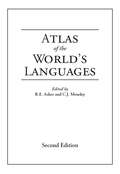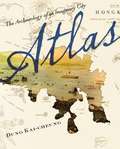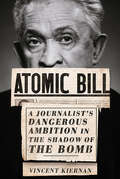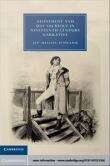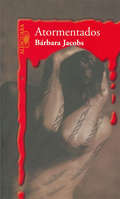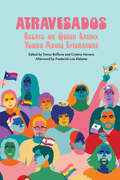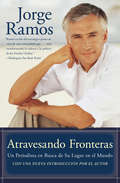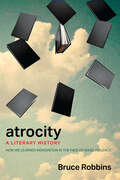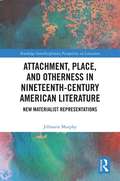- Table View
- List View
At the Mermaid Inn
by Duncan Campbell Scott Douglas Lochhead Archibald Lampman Barrie Davies Wilfred CampbellThe original At the Mermaid Inn, one of the most notable literary endeavours in Canada, was the result of the combined efforts of three poets: Wilfred Campbell (1858-1918), Archibald Lampman (1861-99), and Duncan Campbell Scott (1862-1947).A Saturday column that ran in the Toronto Globe from 6 February 1892 until 1 July 1893, it covered a wide range of material – original poetry and prose, book and music reviews, articles on philosophy, politics, poetics, religion, and writings on a myriad of other matters. Critics have often referred to the column in general terms, but until now it has been unavailable in book form for detailed study. This careful transcription of the entire series offers a fresh perspective on three of the most important Canadian literary figures of the nineteenth and early twentieth centuries.Here are three major Canadian poets as prose writers. Lampman writes essays about nature and poetry; Campbell provides controversial views on many subjects, especially religion and poetry; Scott writes book reviews and scholarly essays on music and a variety of Canadian matters. At the Mermaid Inn gives a fascinating glimpse into the literary and social concerns of the day. This volume beings to new light one of the most readable and vital documents in Canadian life and literature.
At the Roots of Italian Identity: 'Race' and 'Nation' in the Italian Risorgimento, 1796-1870 (Routledge Studies in the Modern History of Italy)
by Edoardo Marcello BarsottiThis book investigates the relationship between the ideas of nation and race among the nationalist intelligentsia of the Italian Risorgimento and argues that ideas of race played a considerable role in defining Italian national identity. The author argues that the racialization of the Italians dates back to the early Napoleonic age and that naturalistic racialism—or race-thinking based on the taxonomies of the natural history of man—emerged well before the traditionally presumed date of the late 1860s and the advent of positivist anthropology. The book draws upon a wide number of sources including the work of Vincenzo Cuoco, Giuseppe Micali, Adriano Balbi, Alessanro Manzoni, Giandomenico Romagnosi, Cesare Balbo, Vincenzo Gioberti, and Carlo Cattaneo. Themes explored include links to antiquity on the Italian peninsula, archaeology, and race-thinking.
At the Same Time: Essays and Speeches
by Susan SontagSontag writes of the freedom of literature, about courage and resistance, and fearlessly addresses the dilemmas of post-9/11 America, from the degradation of our political rhetoric to the appalling torture of prisoners in Abu Ghraib.
At the Speed of Light There is Only Illumination: A Reappraisal of Marshall McLuhan (Reappraisals: Canadian Writers)
by John Moss Linda M. MorraAt the Speed of Light There is Only Illumination collects a dozen re-evaluative essays on Marshall McLuhan and his critical and theoretical legacy; from intellectual adventurer creating a complex architecture of ideas to cultural icon standing in line in Woody Allen’s Annie Hall. Given McLuhan’s prominent status in many academic disciplines, the contributors reflect a multi-disciplinary background. John Moss and Linda Morra chose the essays from a gathering of McLuhan’s academic devotees. The contribution – from “McLuhan as Medium” and “McLuhan in Space” to “What McLuhan Got Wrong” and “Trouble in the Global Village” – to provide a kaleidoscope of new views. As Moss writes of the collected essays: “Some are big and some are small, some exegetic and some confessional, some stand as major statements and others are sidelong glances; some resonate with the concerns of public discourse and others are private or privileged or impious and provocative. Each consists of many parts, each a design on its own. They speak to each other…they may have come together as one version of what happened.”
At the Strangers' Gate: Arrivals in New York
by Adam GopnikA vivid memoir that captures the energy, ambition and romance of New York in the 1980s from the beloved New Yorker Canadian writer, to stand alongside his bestselling Paris to the Moon and Through the Children's Gate.When Adam Gopnik and his soon-to-be-wife, Martha Parker, left the comforts of home in Montreal for New York, the city then, much like today, was a pilgrimage site for the young and the arty and ambitious. But it was also becoming a city of greed, where both life's consolations and its necessities were increasingly going to the highest bidder. At the Stranger's Gate builds a portrait of this moment in New York through the story of their journey--from their excited arrival as aspiring artists to their eventual growth into a New York family. Gopnik transports us to their tiny basement room on the Upper East Side--the smallest apartment in Manhattan--and later to SoHo, where he captures a unicorn: an affordable New York loft. Between tender, laugh-out-loud reminiscences, including affectionate portraits of New York luminaries from Richard Avedon to Robert Hughes and Jeff Koons, Gopnik takes us into the corridors of Condé Nast, the galleries of MoMA and many places between to illuminate the fascinating world capital of creativity and aspiration that is New York, then and now.
At the Strangers' Gate: Arrivals in New York
by Adam GopnikFrom The New York Times best-selling author of Paris to the Moon and beloved New Yorker writer, a memoir that captures the romance of New York City in the 1980s. When Adam Gopnik and his soon-to-be-wife, Martha, left the comforts of home in Montreal for New York, the city then, much like today, was a pilgrimage site for the young, the arty, and the ambitious. But it was also becoming a city of greed, where both life's consolations and its necessities were increasingly going to the highest bidder. At the Strangers' Gate builds a portrait of this particular moment in New York through the story of this couple's journey--from their excited arrival as aspiring artists to their eventual growth into a New York family. Gopnik transports us to his tiny basement room on the Upper East Side, and later to SoHo, where he captures a unicorn: an affordable New York loft. He takes us through his professional meanderings, from graduate student-cum-library-clerk to the corridors of Condé Nast and the galleries of MoMA. Between tender and humorous reminiscences, including affectionate portraits of Richard Avedon, Robert Hughes, and Jeff Koons, among many others, Gopnik discusses the ethics of ambition, the economy of creative capital, and the peculiar anthropology of art and aspiration in New York, then and now.
At the Titan's Breakfast: Three Essays on Byron's Poetry (Routledge Library Editions: Lord Byron #7)
by Robert PolitoThis title, first published in 1987, comprises of three essays which examine Lord Byron’s poetry. Some of Byron’s most famous poems are examined, including Don Juan and Childe Harold's Pilgrimage. This title will be of interest to students of literature.
Ataque a un enemigo de la libertad
by Ciceron40 grandes ideas que han cambiado el mundo. Los mordaces discursos de Cicerón en contra de las ambiciones dictatoriales de Marco Antonio se encuentran entre los más famosos e influyentes de la historia y constituyen el apasionado testamento del más grande estadista de su época; un último intento por recuperar su querida República que le costaría la vida. <P><P>A lo largo de la historia, algunos libros han cambiado el mundo. Han transformado la manera en que nos vemos a nosotros mismos y a los demás. Han inspirado el debate, la discordia, la guerra y la revolución. Han iluminado, indignado, provocado y consolado. Han enriquecido vidas, y también las han destruido. Taurus publica las obras de los grandes pensadores, pioneros, radicales y visionarios cuyas ideas sacudieron la civilización y nos impulsaron a ser quienes somos.
Ataque a un enemigo de la libertad
by Ciceron40 grandes ideas que han cambiado el mundo. Los mordaces discursos de Cicerón en contra de las ambiciones dictatoriales de Marco Antonio se encuentran entre los más famosos e influyentes de la historia y constituyen el apasionado testamento del más grande estadista de su época; un último intento por recuperar su querida República que le costaría la vida. A lo largo de la historia, algunos libros han cambiado el mundo. Han transformado la manera en que nos vemos a nosotros mismos y a los demás. Han inspirado el debate, la discordia, la guerra y la revolución. Han iluminado, indignado, provocado y consolado. Han enriquecido vidas, y también las han destruido. Taurus publica las obras de los grandes pensadores, pioneros, radicales y visionarios cuyas ideas sacudieron la civilización y nos impulsaron a ser quienes somos. La crítica ha dicho sobre la colección «Great Ideas»...«Un fenómeno editorial.»The Guardian «De veras que la edición es primorosa y pocas veces contenido y continente pueden encontrarse mejor ensamblados y unidos. ¡Qué portadas! Para enmarcar. [...] Ante las «Great Ideas», solo cabe quitarse el sombrero. ¡Chapeu!»ABC «A parte de los contenidos, en general muy bien elegidos, son tan bonitos que si los ven seguro que cae alguno.»El País
Atheism
by Alexandre KojèveOne of the twentieth century’s most brilliant and unconventional thinkers, Alexandre Kojève was a Russian émigré to France whose lectures on Hegel in the 1930s galvanized a generation of French intellectuals. Although Kojève wrote a great deal, he published very little in his lifetime, and so the ongoing rediscovery of his work continues to present new challenges to philosophy and political theory. Written in 1931 but left unfinished, Atheism is an erudite and open-ended exploration of profound questions of estrangement, death, suicide, and the infinite that demonstrates the range and the provocative power of Kojève’s thought.Ranging across Heidegger, Buddhism, Christianity, German idealism, Russian literature, and mathematics, Kojève advances a novel argument about freedom and authority. He investigates the possibility that there is not any vantage point or source of authority—including philosophy, science, or God—that is outside or beyond politics and the world as we experience it. The question becomes whether atheism—or theism—is even a meaningful position since both affirmation and denial of God’s existence imply a knowledge that seems clearly outside our capacities. Masterfully translated by Jeff Love, this book offers a striking new perspective on Kojève’s work and its implications for theism, atheism, politics, and freedom.
Atheist Manifesto: The Case Against Christianity, Judaism, and Islam
by Jeremy Leggatt Michel OnfrayThis book is the about religion, atheism and secularism. It is a philosophical polemic against religions and a call for secularism.
Athena (Gods and Heroes of the Ancient World #Vol. 7)
by Susan DeacyIn this definitive assessment of the various representations and approaches to Athena, Susan Deacy does what no other has done before and brings all the aspects of this legendary figure into one, outstanding study. A survey of one of the most enduringly popular of ancient deities, the book introduces Athena’s myth, cult and reception, while directing the reader to detailed discussion as and when it is appropriate. Students will find it a great help in their studies, and for the general reader with an interest in the ancient world and for those from related disciplines such as literature, art history and religion, it provides a mine of information and insight into this fascinating classical figure.
Athena Unbound: Why and How Scholarly Knowledge Should Be Free for All
by Peter BaldwinA clear-eyed examination of the open access movement: past history, current conflicts, and future possibilities.Open access (OA) could one day put the sum of human knowledge at our fingertips. But the goal of allowing everyone to read everything faces fierce resistance. In Athena Unbound, Peter Baldwin offers an up-to-date look at the ideals and history behind OA, and unpacks the controversies that arise when the dream of limitless information slams into entrenched interests in favor of the status quo. In addition to providing a clear analysis of the debates, Baldwin focuses on thorny issues such as copyright and ways to pay for &“free&” knowledge. He also provides a roadmap that would make OA economically viable and, as a result, advance one of humanity&’s age-old ambitions.Baldwin addresses the arguments in terms of disseminating scientific research, the history of intellectual property and copyright, and the development of the university and research establishment. As he notes, the hard sciences have already created a funding model that increasingly provides open access, but at the cost of crowding out the humanities. Baldwin proposes a new system that would shift costs from consumers to producers and free scholarly knowledge from the paywalls and institutional barriers that keep it from much of the world.Rich in detail and free of jargon, Athena Unbound is an essential primer on the state of the global open access movement.
Atlantic Circulations: Literature, Reception and Imperial Identities, 1650-1750 (Routledge Studies in Renaissance and Early Modern Worlds of Knowledge)
by Edward HolbertonAtlantic Circulations investigates literary conversations about empire in the British Atlantic world, c. 1650–1750. Reading texts by Anne Bradstreet, John Milton, Daniel Defoe, and Benjamin Franklin, as well as writing by overlooked authors who deserve more attention, such as the Quaker anti-slavery activist Benjamin Lay and the Black classicist Francis Williams, it asks how literary culture interacted with transatlantic debates about law, enslavement, economics, and religious freedom.This study explores the relationship between literature and empire by joining up disciplinary areas – Early Modern English Literature and Early American Literature – which are often considered apart. It develops insights and analytical frameworks from recent British and ‘Atlantic World’ history to argue that the transatlantic reception of literary texts was often shaped by ‘archipelagic’ dynamics: political and religious tensions between and within England and Wales, and Scotland and Ireland. Atlantic Circulations examines several previously unknown manuscripts and archives which throw new light on the circulation of literary texts in colonial culture and reconstructs key Anglophone transatlantic cultural debates during a crucial phase of European expansion in the Atlantic world.This book will appeal to advanced students and academic researchers of early modern and eighteenth-century English literature and British cultural history, especially readers with an interest in literature’s relationships with empire, colonialism, and travel, and scholars of early American literature and history.
Atlantic Worlds in the Long Eighteenth Century
by Toni Bowers Tita ChicoInnovative and multidisciplinary, this collection of essays marks out the future of Atlantic Studies, making visible the emphases and purposes now emerging within this vital comparative field. The contributors model new ways to understand the unexpected roles that seduction stories and sentimental narratives played for readers struggling to negotiate previously unimagined differences between and among people, institutions, and ideas.
Atlas Shrugged SparkNotes Literature Guide (SparkNotes Literature Guide Series #17)
by SparkNotesAtlas Shrugged SparkNotes Literature Guide by Ayn Rand Making the reading experience fun! When a paper is due, and dreaded exams loom, here's the lit-crit help students need to succeed! SparkNotes Literature Guides make studying smarter, better, and faster. They provide chapter-by-chapter analysis; explanations of key themes, motifs, and symbols; a review quiz; and essay topics. Lively and accessible, SparkNotes is perfect for late-night studying and paper writing. Includes:An A+ Essay—an actual literary essay written about the Spark-ed book—to show students how a paper should be written.16 pages devoted to writing a literary essay including: a glossary of literary termsStep-by-step tutoring on how to write a literary essayA feature on how not to plagiarize
Atlas of the World's Languages: Context And Process (Memory Of Peoples Ser.)
by R. E. Asher and Christopher MoseleyBefore the first appearance of the Atlas of the World's Languages in 1993, all the world's languages had never been accurately and completely mapped. The Atlas depicts the location of every known living language, including languages on the point of extinction. This fully revised edition of the Atlas offers: up-to-date research, some from fieldwork in early 2006 a general linguistic history of each section an overview of the genetic relations of the languages in each section statistical and sociolinguistic information a large number of new or completely updated maps further reading and a bibliography for each section a cross-referenced language index of over 6,000 languages. Presenting contributions from international scholars, covering over 6,000 languages and containing over 150 full-colour maps, the Atlas of the World's Languages is the definitive reference resource for every linguistic and reference library.
Atlas: The Archaeology of an Imaginary City (Weatherhead Books on Asia)
by Kai-Cheung DungSet in the long-lost City of Victoria (a fictional world similar to Hong Kong), Atlas is written from the unified perspective of future archaeologists struggling to rebuild a thrilling metropolis. Divided into four sections—"Theory," "The City," "Streets," and "Signs"—the novel reimagines Victoria through maps and other historical documents and artifacts, mixing real-world scenarios with purely imaginary people and events while incorporating anecdotes and actual and fictional social commentary and critique. <P><P>Much like the quasi-fictional adventures in map-reading and remapping explored by Paul Auster, Jorge Luis Borges, and Italo Calvino, Dung Kai-cheung's novel challenges the representation of place and history and the limits of technical and scientific media in reconstructing a history. It best exemplifies the author's versatility and experimentation, along with China's rapidly evolving literary culture, by blending fiction, nonfiction, and poetry in a story about succeeding and failing to recapture the things we lose. Playing with a variety of styles and subjects, Dung Kai-cheung inventively engages with the fate of Hong Kong since its British "handover" in 1997, which officially marked the end of colonial rule and the beginning of an uncharted future.
Atomic Bill: A Journalist's Dangerous Ambition in the Shadow of the Bomb
by Vincent KiernanIn Atomic Bill, Vincent Kiernan examines the fraught career of New York Times science journalist, William L. Laurence and shows his professional and personal lives to be a cautionary tale of dangerous proximity to power. Laurence was fascinated with atomic science and its militarization. When the Manhattan Project drew near to perfecting the atomic bomb, he was recruited to write much of the government's press materials that were distributed on the day that Hiroshima was obliterated. That instantly crowned Laurence as one of the leading journalistic experts on the atomic bomb. As the Cold War dawned, some assessed Laurence as a propagandist defending the militarization of atomic energy. For others, he was a skilled science communicator who provided the public with a deep understanding of the atomic bomb. Laurence leveraged his perch at the Times to engage in paid speechmaking, book writing, filmmaking, and radio broadcasting. His work for the Times declined in quality even as his relationships with people in power grew closer and more lucrative. Atomic Bill reveals extraordinary ethical lapses by Laurence such as a cheating scandal at Harvard University and plagiarizing from press releases about atomic bomb tests in the Pacific. In 1963 a conflict of interest related to the 1964 World's Fair in New York City led to his forced retirement from the Times. Kiernan shows Laurence to have set the trend, common among today's journalists of science and technology, to prioritize gee-whiz coverage of discoveries. That approach, in which Laurence served the interests of governmental official and scientists, recommends a full revision of our understanding of the dawn of the atomic era.
Atonement and Self-Sacrifice in Nineteenth-Century Narrative
by Jan-Melissa SchrammJan-Melissa Schramm explores the conflicted attitude of the Victorian novel to sacrifice, and the act of substitution on which it depends. The Christian idea of redemption celebrated the suffering of the innocent: to embrace a life of metaphorical self-sacrifice was to follow in the footsteps of Christ's literal Passion. Moreover, the ethical agenda of fiction relied on the expansion of sympathy which imaginative substitution was seen to encourage. But Victorian criminal law sought to calibrate punishment and culpability as it repudiated archaic models of sacrifice that scapegoated the innocent. The tension between these models is registered creatively in the fiction of novelists such as Dickens, Gaskell and Eliot, at a time when acts of Chartist protest, national sacrifices made during the Crimean War, and the extension of the franchise combined to call into question what it means for one man to 'stand for', and perhaps even 'die for', another.
Atormentados
by Barbara JacobsEsta obra nos confronta con mujeres y hombres que no aceptan la imposición de un modo de vida. El genio está a su lado en forma de literatura, danza, música, pintura o filosofía, y todo lector encontrará que comparten algo con él: la conciencia de que existir bajo los términos de los otros no siempre es una opción. Con ensayos breves y contundentes, Bárbara Jacobs nos muestra los lazos entre las acciones de estos artistas, su obra y nuestra psique; nos adentra en un tema tan fundamental como apasionante: la condición humana con todas sus impurezas, sus giros imprevistos y, siempre acechando, la locura. Ambrose Bierce; Horacio Quiroga; Van Gogh; Wiliam Faulkner; Charles Baudelaire; Cesare Pavese...
Atravesados: Essays on Queer Latinx Young Adult Literature (Children's Literature Association Series)
by Trevor Boffone and Cristina HerreraContributions by Frederick Luis Aldama, Trevor Boffone, T. Jackie Cuevas, Cristina Herrera, Alexander Lalama, Angel Daniel Matos, Regina Marie Mills, Joseph Isaac Miranda, Jesus Montaño, Domino Renee Pérez, Regan Postma-Montaño, Cristina Rhodes, and Sonia Alejandra RodríguezAtravesados: Essays on Queer Latinx Young Adult Literature shows how Latinx queer YA writers discard the “same old story,” and offer critical representations of queerness that broaden YA writing and insist on the presence of queer teens of color. Atravesados draws on foundational Chicana queer theorist Gloria Anzaldúa’s notion of “atravesados” to speak to the spectrum of queer youth Latinidades as they materialize in YA literature. Los atravesados, according to Anzaldúa, are “the squint-eyed, the perverse, the queer, the troublesome, the mongrel, the mulato, the half-breed, the half dead; in short, those who cross over, pass over, or through the confines of the ‘normal.’” Los atravesados reside in the borderlands space of ni de aquí ni de allá, neither here nor there, present yet liminal, their queerness the very source of both frustration and empowerment, a paradox of joy and tragedy. Although written in 1987, Anzaldúa’s theory speaks to the realities of queer Latinx teens that fill the pages of YA literature well into the twenty-first century. Characters such as Juliet from Gabby Rivera’s Juliet Takes a Breath, Aaron from Adam Silvera’s More Happy Than Not, or the titular Chulito from Charles Rice-Gonzales’s novel encompass the highs, lows, and everything in-betweenness of queer Latinx teen lived experiences. This collection tells their stories.Contributors speak to the spectrum of queer youth Latinidades as they materialize in YA literature, paying close attention to representation and the ways youth are portrayed—whether accurate or stereotypical. Close attention is paid to books that succeed in broadening the field of YA, highlighting authors that draw from their own lived experiences and situate strong, fully developed characters. Taken together, these essays move beyond the page, explaining to readers why representation and authenticity matter in YA literature, as well as the far-reaching effects they can have for real world queer Latinx teens.
Atravesando Fronteras
by Jorge RamosRelato autobiográfico. Revela toda clase de detalles sobre la vida del famoso periodista Jorge Ramos. Por primera vez, este prestigiado presentador de noticias en Español comparte anécdotas conocidas y ocultas de su existencia con los lectores, televidentes y radioescuchas que han seguido atentos su despuntante carrera profesional. Descubrimos aquí al hombre cuya atracción por las emociones fuertes lo ha puesto reiteradamente en peligro, y cuyo sentido del humor lo ha salvado de las situaciones más incómodas. Padre, reportero, esposo e hijo; todas sus facetas se describen aquí, sin escatimar recursos. El sentido aventurero y práctico del protagonista nos brindará con la lectura, además, una excelente lección de vida. Los pasajes intensamente contados en el libro nos permitirán viajar de la mano de una persona que se confiesa itinerante; ofreciendo, por lo tanto, un amplio archivo emocional de vivencias recogidas de múltiples lugares y encuentros con los más variados y controversiales personajes del planeta.
Atrocity: A Literary History
by Bruce RobbinsExploring literary representations of mass violence, Bruce Robbins traces the emergence of a cosmopolitan recognition of atrocity. Mass violence did not always have a name. Like conquest, what we think of now as atrocities have not always invited indignation or been seen to violate moral norms. Venturing from the Bible to Zadie Smith, Robbins explores the literature of suffering, to show how, over time, abhorrence of mass violence takes shape. With it comes the emergence of a necessary element of cosmopolitanism: the ability to look at one's own nation with the critical eyes of a stranger. Drawing on a vast written archive and with penetrating insight, Robbins takes up such literary representations of violence as Bartolomé de las Casas's account of his fellow Spaniards' atrocities, Kurt Vonnegut's Slaughterhouse-Five, Grimmelshausen's 1668 novel Simplicissimus, David Mitchell's Cloud Atlas, Gabriel García Márquez's One Hundred Years of Solitude, Homero Aridjis's short novel Smyrna in Flames, and Tolstoy's Hadji Murat. These essential texts do more than simply testify to atrocious acts. In their literariness, they take the risk of contextualizing and relativizing, thereby extending beyond the legal paradigm of accusation. They recognize atrocity as a moral scandal about which something should be done and can be done, while they also place that scandal within a larger and more uncertain history.
Attachment, Place, and Otherness in Nineteenth-Century American Literature: New Materialist Representations (Routledge Interdisciplinary Perspectives on Literature)
by Jillmarie MurphyThis interdisciplinary study examines the role interpersonal and place attachment bonds play in crafting a national identity in American literature. Although there have been numerous ecocritical studies of and psychoanalytic approaches to American literature, this study seeks to integrate the language of empirical science and the physical realities of place, while also investigating non-human agency and that which exists beyond the material realm. Murphy considers how writers in the early American Republic constructed modernity by restructuring representations of interpersonal and place attachments, which are subsequently reimagined, reconfigured, and sometimes even rejected by writers in the long nineteenth century. Within each narrative American perceptions of otherness are pathologized as a result of insecure human-to-human and human-to-place attachments, resulting in a restructuring of antiquated notions of difference. Throughout, Murphy argues that in order to understand fully the contextually varied framework of human bonding, it is important to emphasize America’s "attachment" to various constructions of otherness. Historically, people of color, women, ethnic groups, and lower class citizens have been relegated—socially, politically, and culturally—to a place of subordination. Refugees escaping the French and Haitian Revolutions to American cities encouraged writers to transform social, cultural, and political attachments in ways that the American Revolution did not. The United States has always been part of an extended global network that provides fertile ground from which to imagine a future American identity; this book thus gestures toward future readers, educators, and scholars who seek to explore new fields and new approaches to understand the underlying human motivations that continually inspire the American imagination.
